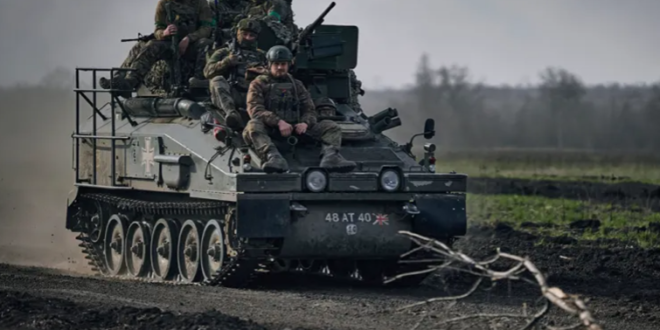Russian group claims advance but Ukraine says its forces are still holding out as fighting remains ‘particularly hot’.
Russia’s Wagner Group has claimed “legal” control of Ukraine’s Bakhmut, but Kyiv said its forces still held the eastern town, describing the fighting there as “particularly hot”.
Yevgeny Prigozhin, the head of the paramilitary force, said on Monday that his troops, involved in a months-long effort to encircle and capture the bombed-out town, had raised a Russian flag on its administrative building.
“From a legal point of view, Bakhmut has been taken. The enemy is concentrated in the western parts,” Prigozhin said in an audio message posted on his press service’s Telegram account.
But there was no indication from Ukrainian officials that Bakhmut, a town of 70,000 before the Russian invasion launched over a year ago, had fallen into Russian hands.
Prigozhin has previously made claims that were premature.
Ukrainian military leaders said on Monday after Prigozhin’s video was released that enemy troops had tried to take control of the town, but their forces had “repelled more than 20 enemy attacks”.
President Volodymyr Zelenskyy earlier on Sunday praised Ukrainian troops’ defence of the city.
“Thank you to our soldiers who are fighting in Avdiivka, Maryinka, and Bakhmut,” Zelenskyy said in his nightly video address. “Especially Bakhmut. It is especially hot there.”
Ukrainian Deputy Defence Minister Hanna Maliar had earlier described the situation around the town as “tense”. Ukrainian forces were defending their positions, and Russian forces were paying scant attention to losses as they attacked, Maliar said.
Al Jazeera could not verify the battlefield reports.
Ukrainian military commanders have said their own counteroffensive – backed by newly delivered Western tanks and other hardware – is not far off, but have stressed the importance of holding Bakhmut in the meantime.
Prominent Ukrainian military analyst Oleh Zhdanov said fighting had engulfed the centre of Bakhmut. Ukrainian forces had repelled 25 enemy attacks, but Russian forces had captured the AZOM metal plant, which Ukrainian troops had defended for days.
“The enemy is attacking the city centre from the north, the east and the south and is trying to take the city under its full control,” Zhdanov, who has close ties to the Ukrainian military, said in a video shown on YouTube.
In Kostyantynivka, a town about 27km (17 miles) from Bakhmut, a “massive attack” of Russian missiles killed three men and three women and wounded 11 others on Sunday, Ukrainian authorities said.
The attack targeted residential areas where “ordinary civilians” were living, Zelenskyy said.
There was a large crater in a yard and windows were shattered from ground to top floors in two 14-storey tower blocks, while private homes nearby had smashed roofs, the AFP news agency reported.
In Russia, a well-known military blogger, Vladlen Tatarsky, was killed by a bomb blast in a Saint Petersburg café on Sunday in what appeared to be the second assassination on Russian soil of a figure closely associated with the war in Ukraine.
Russia’s state Investigative Committee said it had opened a murder investigation into the blast, which wounded 25 people.
It was not immediately known who was behind the killing. Wagner’s Prigozhin said he would “not blame the Kyiv regime” for it, but another leading Russian official pointed the finger at Ukraine without providing evidence.
A Ukrainian presidential adviser said “domestic terrorism” was breaking out in Russia.
The Kremlin meanwhile condemned the Western “hype” around the arrest of United States journalist Evan Gershkovich on espionage charges, dismissing Washington’s latest call for his release.
Russia’s foreign minister Sergey Lavrov told his US counterpart Antony Blinken that Gershkovich had been “trying to receive secret information” when he was arrested this week.
Gershkovich, a Wall Street Journal reporter, is believed to be the first foreign journalist held for spying in post-Soviet Russia, and his arrest is expected to escalate the Kremlin’s confrontation with the West.
His arrest on March 30 has drawn outrage from the West and is being seen as a serious escalation of Moscow’s sweeping crackdown on the media.
“The timing of the arrest looks like a calculated provocation to embarrass the US and intimidate the foreign press still working in Russia,” the Wall Street Journal’s board of opinion editors said.
The White House has condemned the allegations as “ridiculous” and has warned Americans currently in Russia to leave for their own safety.
Several other US citizens are in jail in Russia, including Paul Whelan, a former Marine, who was arrested in 2018 and handed a 16-year sentence on espionage charges that he denies.
 Eurasia Press & News
Eurasia Press & News




